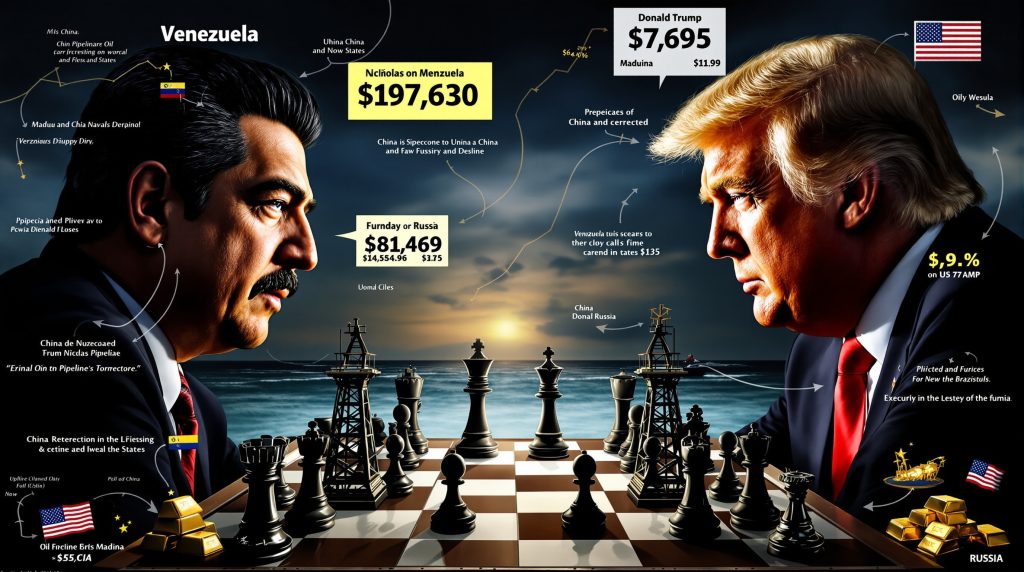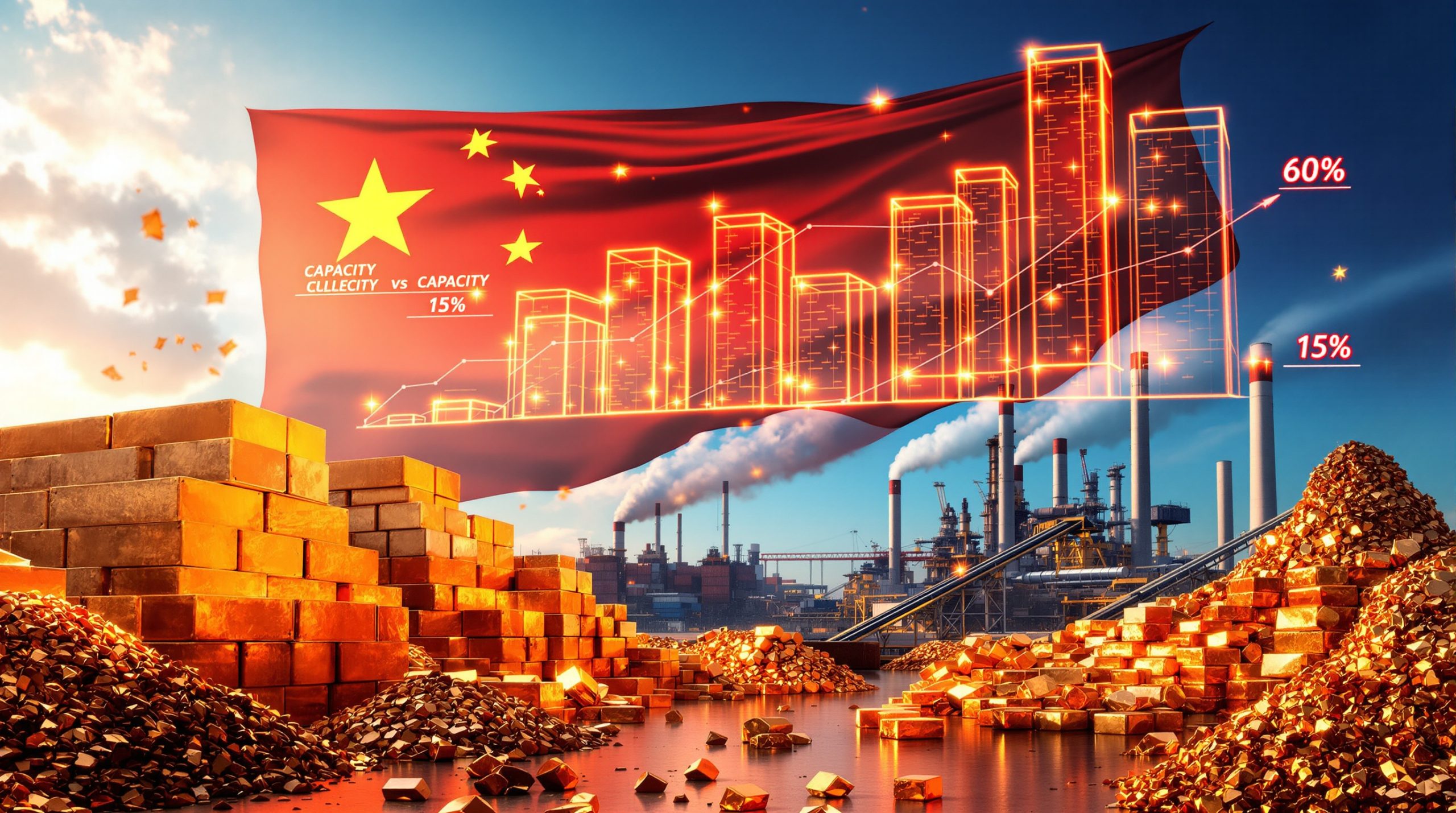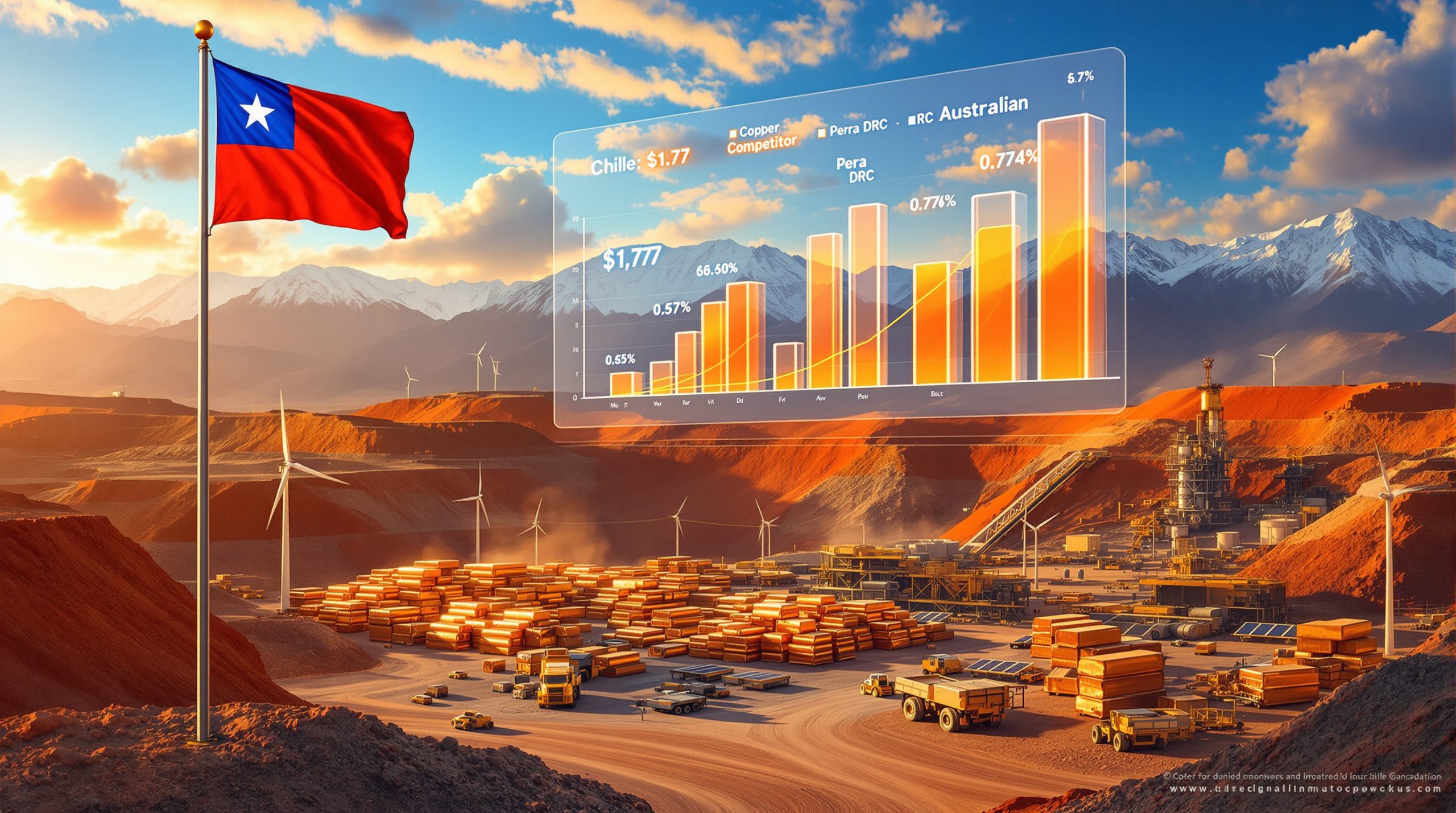Maduro's Venezuela Oil Offer to Trump: Geopolitical Chess in the Caribbean
In recent years, a diplomatic maneuver of significant geopolitical implications has unfolded in the Western Hemisphere: Venezuela's President Nicolás Maduro reportedly extended a substantial proposal to the Trump administration, offering preferential access to the country's vast oil reserves. This strategic move represents a dramatic shift in Venezuela's energy diplomacy, which had previously favored partnerships with Russia, China, and Iran.
What Was Venezuela's Oil Offer to the Trump Administration?
The reported offer from Maduro's government came amid escalating tensions between Washington and Caracas, with the Venezuelan government seeking to ease diplomatic pressure and prevent potential military confrontation. This diplomatic outreach occurred against the backdrop of Venezuela's status as the holder of approximately 303.8 billion barrels of proven oil reserves – the largest in the world according to OPEC's Annual Statistical Bulletin 2023.
Venezuela's oil production has experienced a dramatic decline in recent years, standing at approximately 735,000 barrels per day (b/d) in September 2024, according to secondary sources cited in OPEC's Monthly Oil Market Report. This represents a staggering decline from historical peaks of over 3 million b/d in the late 1990s, highlighting the economic crisis facing the country.
The Orinoco Oil Belt, which contains much of Venezuela's reserves, presents unique technical challenges. The extra-heavy crude oil there has an API gravity ranging from 4° to 16°, requiring specialized refining capabilities. These resources demand significant technical expertise and investment for extraction and processing – expertise that American companies could potentially provide.
Why Did Maduro Offer Venezuelan Oil to Trump?
Existential Pressure on the Regime
The Maduro government has faced mounting pressure from multiple directions:
- Intensified economic sanctions crippling Venezuela's economy
- Increased U.S. military presence in the Caribbean
- American interdiction operations targeting vessels near Venezuelan waters
- Washington's recognition of opposition leadership as Venezuela's legitimate president
- Growing isolation in the Western Hemisphere
This confluence of pressures created what analysts describe as an "existential threat" to the Maduro administration, motivating the unusual diplomatic outreach.
Economic Desperation Driving Policy
Venezuela's economic collapse has been catastrophic by any measure:
- GDP contracted by approximately 75% between 2013 and 2021, according to the International Monetary Fund
- Hyperinflation reached 65,374% in 2018 according to the Central Bank of Venezuela
- Foreign reserves fell from $30 billion in 2012 to approximately $5.4 billion by 2024
- Oil production declined from 2.4 million b/d in 2015 to below 800,000 b/d by 2024
- PDVSA exports dropped 68% between 2018 and 2020 due to sanctions
The U.S. Department of the Treasury's sanctions implemented in January 2019 prohibited dealings with PDVSA and blocked approximately $7 billion in assets. With the country's economic lifeline—oil production—severely constrained, Maduro's government sought a pragmatic solution through energy diplomacy.
What Specific Terms Did Venezuela Offer?
The Energy Package
While the exact details of any offer require verification from official sources, Venezuela's energy overture reportedly included several significant components:
- Preferential access to Venezuela's oil and gold sectors for U.S. companies
- Redirection of exports from China and Russia toward American markets
- Reduced partnerships with geopolitical rivals of the United States
- Joint development of untapped reserves in the Orinoco Belt
- Potential privatization of certain PDVSA (state oil company) assets
This package would represent a remarkable pivot from Venezuela's previous resource nationalism and anti-American rhetoric, highlighting the severity of the regime's predicament.
Prior to sanctions, U.S. companies including Chevron, Halliburton, Schlumberger, and Baker Hughes operated extensively in Venezuela. Chevron has maintained a presence in the country since the 1920s through various licenses and arrangements, positioning it as a potential key player in any new energy relationship.
Strategic Minerals Beyond Oil
Beyond petroleum, Venezuela also reportedly offered access to:
- Gold mining concessions in the contested Essequibo region
- Rare earth elements deposits largely unexplored in the country's southeast
- Coltan reserves (essential for electronics manufacturing)
- Bauxite deposits for aluminum production
These additional resources represented Venezuela's attempt to leverage all available assets to secure regime stability.
How Did the Trump Administration Respond?
Diplomatic Rebuff
The Trump administration's response was reportedly unequivocal:
- Rejected the offer outright
- Terminated backchannel communications that had facilitated the proposal
- Maintained recognition of opposition leadership as Venezuela's legitimate government
- Continued military positioning in the Caribbean region
- Upheld sanctions regime against Venezuelan oil exports
This rejection demonstrated Washington's unwillingness to normalize relations with Maduro without fundamental political change in Venezuela.
The United States recognized Juan Guaidó as Venezuela's interim president on January 23, 2019, following Maduro's disputed re-election in 2018. This recognition formed the basis for subsequent policy decisions regarding Venezuela's resources.
Limited Energy Exceptions
Despite the broad rejection, the U.S. did authorize certain limited energy collaborations:
- Permitted Shell and Trinidad and Tobago to develop an offshore Venezuelan gas field
- Required inclusion of American firms in any development projects
- Maintained humanitarian exemptions to certain sanctions
- Allowed specific transactions through time-limited licenses
These exceptions reflected Washington's nuanced approach to balancing pressure on the Maduro regime with regional energy security concerns.
What Role Did Chevron Play in U.S.-Venezuela Energy Relations?
Chevron's Unique Position
Chevron maintained a distinctive status in U.S.-Venezuela relations:
- Longest-operating Western oil company in Venezuela (since 1920s)
- Held significant stakes in joint ventures with PDVSA
- Positioned as a potential bridge between Washington and Caracas
- Maintained operations through limited licenses despite broader sanctions
Chevron holds stakes in joint ventures including Petropiar (30% stake), Petroboscan (39.2% stake), and others in Venezuela. The company's century-long presence made it a natural conduit for any potential normalization of energy relations.
Fluctuating License Status
Chevron's operational permissions fluctuated with diplomatic developments:
- License restricted to maintenance-only operations in 2019
- Temporarily expanded in 2023 to allow limited production
- Restricted again following disputed Venezuelan elections
- Partially restored amid shifting policy considerations
In November 2022, the U.S. Office of Foreign Assets Control (OFAC) issued General License 41 allowing Chevron limited operations to produce and export Venezuelan crude. Under this license, Chevron's Venezuelan production reached approximately 150,000 b/d in 2023. The Treasury Department has modified Chevron's license multiple times, with General License 41 being revoked and reinstated with restrictions based on diplomatic developments.
These changes reflected the administration's use of Chevron's presence as a diplomatic lever rather than a purely commercial consideration.
How Did Venezuela's Oil Offer Fit Into Global Energy Geopolitics?
Global Energy Competition
Venezuela's offer came amid intensifying global competition for energy resources:
- U.S. pursuit of energy security through domestic production and friendly suppliers
- China's strategic investments in resource-rich countries facing Western pressure
- Russia's use of energy partnerships to build geopolitical alliances
- Middle Eastern producers seeking to maintain market share
This global context made Venezuela's vast reserves—the world's largest proven oil reserves at approximately 303 billion barrels—a significant geopolitical prize.
China has invested over $60 billion in Venezuela through oil-for-loan agreements since 2007, according to the Inter-American Dialogue's China-Latin America Finance Database. Chinese companies including CNPC and Sinopec have established joint ventures with PDVSA, creating strong ties that would be difficult to unwind.
Regional Energy Landscape
Within the Western Hemisphere, Venezuela's energy potential represented:
- A potential counterbalance to OPEC influence in global oil markets
- A source of heavy crude for specialized U.S. Gulf Coast refineries
- A factor in Caribbean and Central American energy security
- A potential driver of regional economic integration
Several U.S. Gulf Coast refineries, particularly in Louisiana and Texas, are configured to process heavy Venezuelan crude. According to the U.S. Energy Information Administration, approximately 500,000 b/d of U.S. refining capacity was optimized for Venezuelan heavy crude before sanctions.
The rejection of Venezuela's offer maintained the status quo of regional energy dynamics rather than potentially transforming them.
What Were the Military Dimensions of U.S.-Venezuela Tensions?
U.S. Military Posturing
American military activities near Venezuela included:
- Increased naval presence in the Caribbean
- Enhanced surveillance operations
- Counter-narcotics interdiction missions
- Joint exercises with regional allies
- Deployment of specialized assets to neighboring countries
U.S. Southern Command (SOUTHCOM) conducts counter-narcotics operations in the Caribbean and Eastern Pacific. Enhanced Counter-Drug Operations deployment in April 2020 involved Navy destroyers, littoral combat ships, Coast Guard cutters, and patrol aircraft.
According to SOUTHCOM statements, increased U.S. naval presence near Venezuela was officially designated as counter-narcotics operations, targeting drug trafficking organizations operating in the region.
Venezuelan Defense Preparations
In response to perceived threats, Venezuela:
- Conducted military exercises with Russian support
- Reinforced coastal defenses
- Mobilized civilian militia units
- Enhanced surveillance of maritime approaches
- Strengthened ties with military allies including Cuba
These defensive measures reflected the regime's genuine concern about potential military confrontation with the United States.
How Did Domestic Politics Influence the Oil Diplomacy?
U.S. Political Considerations
Domestic factors shaped Washington's response:
- Electoral considerations in key swing states with Venezuelan-American populations
- Congressional pressure for a tough stance on authoritarian regimes
- Advocacy from human rights organizations against normalizing relations
- Energy industry lobbying for access to Venezuelan resources
- Broader policy debates about sanctions effectiveness
These competing influences contributed to the administration's decision to reject Venezuela's overtures.
Venezuelan Internal Dynamics
Within Venezuela, the oil offer reflected:
- Pragmatic faction gaining influence within Maduro's inner circle
- Recognition of the unsustainability of economic isolation
- Internal debates about the future of resource nationalism
- Military leadership's concerns about potential conflict
- Deteriorating public services creating pressure for economic solutions
The offer thus represented not just foreign policy but internal political recalibration within the Maduro government.
What Happened to Venezuela's Oil Sector Under Sanctions?
Infrastructure Deterioration
Venezuela's petroleum infrastructure has suffered severe degradation:
- Lack of maintenance led to equipment failures
- Skilled workforce exodus reduced operational capabilities
- Limited access to parts and technology hindered repairs
- Environmental incidents increased due to neglect
- Power outages disrupted production and refining
According to industry reports, PDVSA deferred approximately $8 billion in maintenance investments between 2014 and 2019. PDVSA employment declined from approximately 150,000 workers in 1998 to an estimated 50,000 by 2020, with significant loss of technical expertise.
These technical challenges compounded the policy and market obstacles facing Venezuelan oil production.
Market Reorientation
Under sanctions, Venezuela's oil trade patterns dramatically shifted:
- Traditional markets in the U.S. were replaced by Asian buyers
- Complex shipping arrangements emerged to disguise cargo origins
- Discounted pricing became necessary to attract restricted markets
- Barter arrangements replaced conventional sales in some cases
- Intermediaries proliferated to facilitate sanctions evasion
Pre-sanctions (2017), the U.S. received approximately 500,000 b/d from Venezuela. Post-sanctions (2020-2024), India and China became primary destinations, with China receiving an estimated 300,000-500,000 b/d through various trading mechanisms.
These adaptations allowed some Venezuelan oil to reach markets but at significant cost and reduced profitability.
What Are the Implications for Future U.S.-Venezuela Relations?
Potential Diplomatic Pathways
Several scenarios remain possible for future relations:
- Continued isolation with periodic, limited engagement
- Gradual normalization tied to specific political reforms
- Sudden rapprochement driven by energy security concerns
- Increased confrontation if regional tensions escalate
- Multilateral approach involving regional stakeholders
The rejection of Maduro offered Venezuela's oil to Trump suggests continued tension remains the most likely short-term outcome.
Energy Security Calculations
Future energy considerations that could influence policy include:
- Global oil market tightness potentially increasing Venezuela's leverage
- U.S. domestic production trends affecting import needs
- Energy transition timelines and their impact on oil price movements
- Development of alternative heavy crude sources
- Refinery configurations and their suitability for different crude types
These factors could eventually create conditions more favorable to reconsidering Venezuela's energy potential. Additionally, oil price stagnation and OPEC production impact on markets may further complicate the geopolitical calculations.
Conclusion: Oil Diplomacy's Limits in the Venezuela Crisis
Venezuela's attempt to leverage its vast oil resources to secure diplomatic relief highlights both the enduring importance of energy in international relations and its limitations as a diplomatic tool. Despite offering preferential access to the world's largest proven oil reserves, the Maduro regime found that Washington prioritized political considerations over potential energy advantages.
This episode demonstrates that while oil remains a strategic asset, it cannot easily overcome deep political divisions, human rights concerns, or geopolitical calculations. As Venezuela's crisis continues and US economic pressures evolve with changing administrations, the interplay between petroleum politics and international relations will remain a defining feature of Western Hemisphere diplomacy.
The reported oil-for-peace proposal stands as a significant moment in Venezuela's ongoing crisis—a bold diplomatic gambit that ultimately failed to change the trajectory of U.S.-Venezuela relations but revealed the desperate calculations of a regime under extreme pressure.
Disclaimer
This analysis is based on available information and reports from various sources. The specific details of any diplomatic communications between Venezuela and the United States would require verification through official channels. Economic and production figures are subject to change as new data becomes available. This article does not constitute investment advice or political endorsement of any position in the complex Venezuela situation.
Are You Searching for the Next Major Resource Discovery?
Discover significant mineral opportunities before they hit mainstream markets with Discovery Alert's proprietary Discovery IQ model, which transforms complex ASX announcements into actionable investment insights. Explore how major mineral discoveries can generate exceptional returns by visiting Discovery Alert's dedicated discoveries page.




